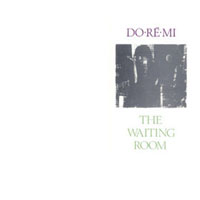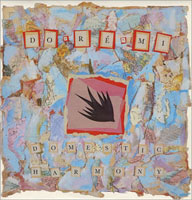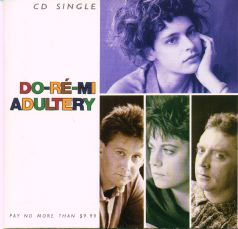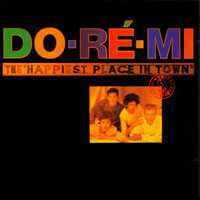
Nicholas More Seymour is an Australian musician and record producer. He is the founding bass guitarist and a mainstay of the rock group Crowded House, and is the younger brother of Mark Seymour, singer-songwriter-guitarist in the rock band Hunters and Collectors.

Deborah Ann Conway is an Australian rock singer-songwriter and guitarist, and had a career as a model and actress. She was a founding member of the 1980s rock band Do-Ré-Mi with their top-5 hit "Man Overboard".
Peter Robert Jones was an English-born Australian musician. He replaced Paul Hester on drums for Crowded House in mid-1994. After the band split up in June 1996, he played in Deadstar with Caroline Kennedy and Nick Seymour, but did not return to Crowded House when they re-formed in 2006 about a year after Hester's death. Jones worked as a secondary teacher in Melbourne and on 18 May 2012, he died from brain cancer, aged 49.

Mi-Sex is a New Zealand new wave band originally active from 1978 to 1986, and led for much of its existence by Steve Gilpin as vocalist, Kevin Stanton as guitarist and songwriter, Murray Burns as keyboardist and songwriter, and Don Martin as bassist. The group's manager for much of its career was Bob Yates. Mi-Sex achieved two top 10 hit singles in 1979-80: "Computer Games" in October 1979 and "People" in 1980. Their first two albums both reached the New Zealand top 10, Graffiti Crimes and Space Race. They were known for their cutting edge production and dynamic live shows. Gilpin died in January 1992, two months after a serious car accident from which he never recovered. Mi-Sex have periodically reformed, including in 2011 with Steve Balbi (ex-Noiseworks) on lead vocals. Stanton died on 17 May 2017, Martin on 10 August 2020.

David Richard McComb was an Australian musician. He was the singer-songwriter and guitarist of the Australian bands, The Triffids (1976–89) and The Blackeyed Susans (1989–93). He also had a solo career including leading David McComb and The Red Ponies.

Conway Victor Savage was an Australian rock musician. He was a member of Nick Cave and The Bad Seeds, providing piano, organ & backing vocals from 1990 to 2017.
The Black Sorrows are an Australian blues rock band formed in 1983 by mainstay vocalist Joe Camilleri, who also plays saxophone and guitar. Camilleri has used various line-ups to record 17 albums, with five reaching the top 20 on the ARIA Albums Charts: Hold on to Me, Harley and Rose, Better Times, The Chosen Ones - Greatest Hits and Lucky Charm. Their top 40 singles are "Chained to the Wheel", "Harley + Rose" and "Snake Skin Shoes".

Do-Ré-Mi was an Australian pop rock band formed in Sydney in 1981 by Deborah Conway, Dorland Bray, Helen Carter and Stephen Philip (guitar). They were one of Australia's most respected and successful post-punk groups. Do-Ré-Mi recorded self-titled EP and The Waiting Room for independent label Green Records before signing to Virgin Records and recording their first LP, Domestic Harmony in 1985 with Gavin MacKillop producing. Domestic Harmony achieved gold sales and contained their most played song, "Man Overboard", which was a top 5 hit single in 1985. This song was notable for its lyrical references to penis envy and pubic hair. Do-Ré-Mi's follow-up singles Idiot Grin and Warnings Moving Clockwise reached the Top 100.

The Waiting Room is the second EP by Australian rock/pop group Do-Ré-Mi and was released by independent label Larrikin Records in January 1983. The album has six tracks, which were written by lead vocalist Deborah Conway, drummer Dorland Bray, bass guitarist Helen Carter and guitarist Stephen Philip. "Man Overboard" made its first appearance on this EP, but was re-worked and released as a single in 1985 to become a surprise top 5 hit, it included lyrics referring to anal humour, penis envy and pubic hair; and had no chorus. Paul Hester, later drummer for Split Enz and Crowded House, was living with Conway and guested on timbales for the track, "(Just Like) Hercules".

Do-Ré-Mi or Standing on Wires is the debut EP album by Australian rock/pop group Do-Ré-Mi which was released by independent label Green Records in August 1982. The album has four tracks, which were written by lead vocalist Deborah Conway, drummer Dorland Bray, bass guitarist Helen Carter and guitarist Stephen Philip. Philip had been a session musician but was invited to join the band during recording in July.

Domestic Harmony is the debut studio album by Australian rock/pop group Do-Ré-Mi which was released by Virgin Records in August 1985. The album has ten tracks, which were written by lead vocalist Deborah Conway, drummer Dorland Bray, bass guitarist Helen Carter and guitarist Stephen Philip.

"Man Overboard" is a song by Australian rock/pop group Do-Ré-Mi recorded in 1982 for the EP The Waiting Room. The song was re-recorded in 1985 and released in May 1985 as the lead single from the group's debut studio album, Domestic Harmony. The 7" vinyl version has three tracks, which were written by lead vocalist Deborah Conway, drummer Dorland Bray, bass guitarist Helen Carter and guitarist Stephen Philip.

"Idiot Grin" is a song by Australian rock/pop group Do-Re-Mi released by Virgin Records in August 1985 as the second single from their debut studio album. The song peaked at number 43 in Australia.

"Warnings Moving Clockwise" is a song by Australian rock/pop group Do-Re-Mi released by Virgin Records in November 1985 as the third and final single from their debut studio album. The song peaked at number 72 in Australia.

"Guns and Butter" is a song by Australian rock/pop group Do-Ré-Mi released by Virgin Records in October 1986. The song peaked at number 48 on the Australian charts.

"King of Moomba" is a song by Australian rock/pop group Do-Ré-Mi released by Virgin Records in January 1988 as the second single from the group's second album The Happiest Place in Town. The song was written by lead vocalist Deborah Conway, drummerDorland Bray, bass guitarist Helen Carter and guitarist Stephen Philip. While the B-side "Tearing up the Carpet" was written by Carter and Philip. The song peaked at number 52 on the Australian charts.

Adultery is a song by Australian rock/pop group Do-Ré-Mi, released by Virgin Records in October 1987, as the lead single from the band's second studio album, The Happiest Place in Town. The song peaked at number 27 on the Australian charts.

"The Happiest Place in Town" is a song by Australian rock/pop group Do-Ré-Mi released by Virgin Records in May 1988 as the fourth and final single, from their second studio album The Happiest Place in Town.

Gregory Charles Arnold is an Australian singer-songwriter, multi-instrumentalist, producer and academic. Arnold won the APRA Songwriter of the Year award in 1993 and performs regularly as a solo artist and with his folk rock band, Things of Stone and Wood.

Uncovered is the eleventh solo studio album by British-born Australian singer John Farnham, produced by Little River Band's Graeham Goble, and released on 3 July 1980, which peaked at No. 20 on the Australian Kent Music Report album chart and was certified gold in 1981.


















